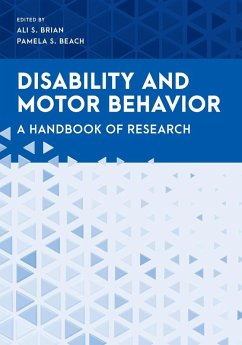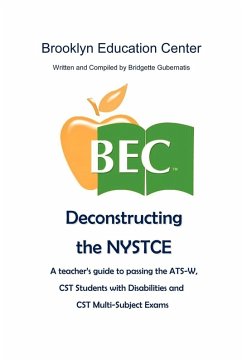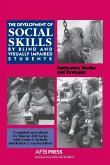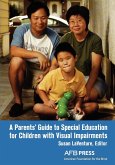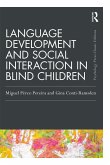Disability and Motor Behavior
Herausgeber: Brian, Ali S.; Beach, Pamela S.
Disability and Motor Behavior
Herausgeber: Brian, Ali S.; Beach, Pamela S.
- Broschiertes Buch
- Merkliste
- Auf die Merkliste
- Bewerten Bewerten
- Teilen
- Produkt teilen
- Produkterinnerung
- Produkterinnerung
Written by leading experts in motor behavior, this book provides the most recent research examining motor learning, motor development, and motor control directly related to special populations, including physical, cognitive, and social emotional behavioral disabilities.
Andere Kunden interessierten sich auch für
![Inclusive Physical Education Around the World Inclusive Physical Education Around the World]() Inclusive Physical Education Around the World44,99 €
Inclusive Physical Education Around the World44,99 €![Language Learning and Deafness Language Learning and Deafness]() Language Learning and Deafness52,99 €
Language Learning and Deafness52,99 €![Deconstructing the NYSTCE Deconstructing the NYSTCE]() Bridgette GubernatisDeconstructing the NYSTCE18,99 €
Bridgette GubernatisDeconstructing the NYSTCE18,99 €![Development of Social Skills by Blind and Visually Impaired Students Development of Social Skills by Blind and Visually Impaired Students]() Development of Social Skills by Blind and Visually Impaired Students53,99 €
Development of Social Skills by Blind and Visually Impaired Students53,99 €![A Parents' Guide to Special Education for Children with Visual Impairments A Parents' Guide to Special Education for Children with Visual Impairments]() A Parents' Guide to Special Education for Children with Visual Impairments45,99 €
A Parents' Guide to Special Education for Children with Visual Impairments45,99 €![Conversations with Interpreter Educators: Exploring Best Practices Volume 9 Conversations with Interpreter Educators: Exploring Best Practices Volume 9]() Christine MonikowskiConversations with Interpreter Educators: Exploring Best Practices Volume 930,99 €
Christine MonikowskiConversations with Interpreter Educators: Exploring Best Practices Volume 930,99 €![Language Development and Social Interaction in Blind Children Language Development and Social Interaction in Blind Children]() Miguel Perez PereiraLanguage Development and Social Interaction in Blind Children46,99 €
Miguel Perez PereiraLanguage Development and Social Interaction in Blind Children46,99 €-
-
-
Written by leading experts in motor behavior, this book provides the most recent research examining motor learning, motor development, and motor control directly related to special populations, including physical, cognitive, and social emotional behavioral disabilities.
Hinweis: Dieser Artikel kann nur an eine deutsche Lieferadresse ausgeliefert werden.
Hinweis: Dieser Artikel kann nur an eine deutsche Lieferadresse ausgeliefert werden.
Produktdetails
- Produktdetails
- Special Education Law, Policy, and Practice
- Verlag: Rowman & Littlefield
- Seitenzahl: 230
- Erscheinungstermin: 27. Oktober 2023
- Englisch
- Abmessung: 254mm x 178mm x 13mm
- Gewicht: 450g
- ISBN-13: 9781538168967
- ISBN-10: 1538168960
- Artikelnr.: 68175487
- Herstellerkennzeichnung
- Libri GmbH
- Europaallee 1
- 36244 Bad Hersfeld
- gpsr@libri.de
- Special Education Law, Policy, and Practice
- Verlag: Rowman & Littlefield
- Seitenzahl: 230
- Erscheinungstermin: 27. Oktober 2023
- Englisch
- Abmessung: 254mm x 178mm x 13mm
- Gewicht: 450g
- ISBN-13: 9781538168967
- ISBN-10: 1538168960
- Artikelnr.: 68175487
- Herstellerkennzeichnung
- Libri GmbH
- Europaallee 1
- 36244 Bad Hersfeld
- gpsr@libri.de
Edited by Ali S. Brian and Pamela S. Beach
Chapter 1: Motor Behavior and Visual Impairment - Alex Stribing and Adam
Pennell
Background
Guiding Frameworks and Assumptions
Gross Motor in Juvenescence
Fine Motor in Juvenescence
Gross Motor in Adulthood
Fine Motor in Adulthood
Honorable Mention: Postural Control and Balance
Systems Perspective: A Spotlight on Psychological Variables
Future Research
Practical Implications
Conclusion
Chapter 2: Motor Behavior and Children who are Hard of Hearing, Deaf, or
Deafblind - Pamela Beach, Melanie Perreault, and Lauren Lieberman
Motor Milestones
Balance
Motor Competence
Practical Implications
Conclusions
Chapter 3: Motor Behavior and Sensory Processing Disorders - Candice
Howard-Smith
Introduction
Sensory Processing Disorders
Types of SPD
SPD and Motor Behavior
SPD, Disabilities, and Motor Behavior
Autism Spectrum Disorder
Down Syndrome
Attention Deficit Hyperactivity Disorder
Future Research
Practical Implications
Conclusions
Chapter 4: Motor Behavior and Autism Spectrum Disorder - Megan MacDonald
and Ming-Chih Sung
Introduction
Young Children (Infants and Preschoolers) with ASD
School-Age Children with ASD
Beyond School: Lifespan Motor Skills of Individuals with ASD
Summary of Evidence
Future Direction
Implications
References
Chapter 5: ASD FMS Interventions - Meghann Lloyd
Importance of Motor Skill Development
Fundamental Motor Skill Interventions
Future Research
Practical Implications
References
Chapter 6: Motor Behavior and Emotional and Behavioral Disorders - Iva
Obrusnikova and Albert R. Cavalier
Definitions of EBD
Prevalence of EBD
Internalizing: Anxiety Disorders Defined
Prevalence of Anxiety Disorders
Conceptual Models of Anxiety disorders
Motor Impairments and Anxiety Disorders
Externalizing: Attention-Deficient/Hyperactivity Disorder Defined
Prevalence of Attention-Deficit/Hyperactivity Disorder
Conceptual Models of Attention-Deficit/Hyperactivity Disorder
Motor Impairments and Attention-Deficit/Hyperactivity Disorder
Altered Cerebral Structures and Neurotransmitter Imbalance
Attention-Deficit/Hyperactivity Disorder Comorbidities
Implications for Research and Practice
References
Chapter 7: Motor Behavior and Specific Language Impairment - Matthias O.
Wagner
Content Overview
Research Overview
Motor Control Related Issues in Specific Language Impairment
Motor Learning Related Issues in Specific Language Impairment
Motor Development Related Issues in Specific Language Impairment
Future Research
Practical Implications
Conclusion
References
Chapter 8: Motor Behavior and Cerebral Palsy - Melissa Pangelinan and
Claire Bridges
Definitions, Etiology, and Diagnosis
Overview
Risk Factor or Possible Causes of CP
Symptoms
Types
Diagnosis and Classification
Empirical Research: Cerebral Palsy and Motor Behavior
CP and Motor Behavior
Early Intervention
Interventions in Childhood and Beyond
Future Research Directions
Translating Research to Practice
Conclusion
References
Chapter 9: Motor Behavior and Neurodegenerative Disorders Associated with
Aging - Nadja Schott
Introduction
Under the Magnifying Glass: Gait as an Important Predictor for
Motor-Cognitive Performance in Alzheimer's and Parkinson's Disease
Motor Learning in Alzheimer's and Parkinson's Disease
Alzheimer's Disease
Parkinson's Disease
Future Research
Practical Implications
Conclusion
References
Chapter 10: Motor Behavior and Intellectual Disabilities - Alyssa LaForme
Fiss and Julia Looper
Introduction
Examples of Genetic Causes
Research on Motor and Cognitive Development
Motor-Control and Motor-Learning in Individuals with ID
Future Research Directions
Research to Practice
Conclusion
References
Chapter 11: Developmental Delay, Developmental Coordination Disorder, and
Motor Behavior - Daphne Golden and Nancy Getchell
Developmental Delay: An Early Sign of Developmental Coordination Disorder
Developmental Coordination Disorder
Identification and Diagnosis of DCD
The Developmental Conundrum in DCD Identification and Diagnosis
Motor Behavior Research Related to DCD
Future Research
Practical Implications
Conclusion
References
Chapter 12: Motor Behavior and Traumatic Brain Injury - James Wilkes, Alexa
Walter, and Semyon Slobounov
Introduction
Clinical Translation of Pathophysiology to Dysfunction
Motor Control Dysfunction after TBI
Balance and Gait
Reaction Time
Oculomotor Function
Kinesiophobia
Future Research
Practical Applications
Conclusion
Conflict of Interest
Acknowledgements
References
Chapter 13: Motor Behavior and Rehabilitation after Spinal Cord Injury -
Collin D. Bowersock and Jessica Lynn McDonnell
Content Overview
Research Overview
Future Research
Practical Implications
Conclusion
References
Chapter 14: Motor Behavior and Profound Intellectual and Multiple
Disabilities - Bethany Sloane, Heather A. Feldner, Lisa Kenyon, and Samuel
W. Logan
Overview, Language, and Terminology Related to Profound Intellectual and
Multiple Disabilities
Motor Behavior and PIMD Population Empirical Research Summary
International Classification of Functioning, Disability and Health Model
for (ICF)
Body Functions and Structures
Motor Development
Challenging Behaviors
Alertness Level
Summary
Activity and Participation
Motor Activity
Physical Activity
Environmental and Personal Factors
Assistive Technology
Supports and Relationships
Attitudes
Summary
Future Research
Practical Implications
Conclusion
References
Chapter 15: Motor Behavior and Health Impairments in Children - Emily
Gilbert
Overview
Pediatric Cancer
Obesity
Diabetes
Motor Competence Research in Youth with Health Impairments
Pediatric Cancer
Obesity
Diabetes
Practical Implications
Future Research
Conclusion
References
Index
About the Editors
About the Contributors
Pennell
Background
Guiding Frameworks and Assumptions
Gross Motor in Juvenescence
Fine Motor in Juvenescence
Gross Motor in Adulthood
Fine Motor in Adulthood
Honorable Mention: Postural Control and Balance
Systems Perspective: A Spotlight on Psychological Variables
Future Research
Practical Implications
Conclusion
Chapter 2: Motor Behavior and Children who are Hard of Hearing, Deaf, or
Deafblind - Pamela Beach, Melanie Perreault, and Lauren Lieberman
Motor Milestones
Balance
Motor Competence
Practical Implications
Conclusions
Chapter 3: Motor Behavior and Sensory Processing Disorders - Candice
Howard-Smith
Introduction
Sensory Processing Disorders
Types of SPD
SPD and Motor Behavior
SPD, Disabilities, and Motor Behavior
Autism Spectrum Disorder
Down Syndrome
Attention Deficit Hyperactivity Disorder
Future Research
Practical Implications
Conclusions
Chapter 4: Motor Behavior and Autism Spectrum Disorder - Megan MacDonald
and Ming-Chih Sung
Introduction
Young Children (Infants and Preschoolers) with ASD
School-Age Children with ASD
Beyond School: Lifespan Motor Skills of Individuals with ASD
Summary of Evidence
Future Direction
Implications
References
Chapter 5: ASD FMS Interventions - Meghann Lloyd
Importance of Motor Skill Development
Fundamental Motor Skill Interventions
Future Research
Practical Implications
References
Chapter 6: Motor Behavior and Emotional and Behavioral Disorders - Iva
Obrusnikova and Albert R. Cavalier
Definitions of EBD
Prevalence of EBD
Internalizing: Anxiety Disorders Defined
Prevalence of Anxiety Disorders
Conceptual Models of Anxiety disorders
Motor Impairments and Anxiety Disorders
Externalizing: Attention-Deficient/Hyperactivity Disorder Defined
Prevalence of Attention-Deficit/Hyperactivity Disorder
Conceptual Models of Attention-Deficit/Hyperactivity Disorder
Motor Impairments and Attention-Deficit/Hyperactivity Disorder
Altered Cerebral Structures and Neurotransmitter Imbalance
Attention-Deficit/Hyperactivity Disorder Comorbidities
Implications for Research and Practice
References
Chapter 7: Motor Behavior and Specific Language Impairment - Matthias O.
Wagner
Content Overview
Research Overview
Motor Control Related Issues in Specific Language Impairment
Motor Learning Related Issues in Specific Language Impairment
Motor Development Related Issues in Specific Language Impairment
Future Research
Practical Implications
Conclusion
References
Chapter 8: Motor Behavior and Cerebral Palsy - Melissa Pangelinan and
Claire Bridges
Definitions, Etiology, and Diagnosis
Overview
Risk Factor or Possible Causes of CP
Symptoms
Types
Diagnosis and Classification
Empirical Research: Cerebral Palsy and Motor Behavior
CP and Motor Behavior
Early Intervention
Interventions in Childhood and Beyond
Future Research Directions
Translating Research to Practice
Conclusion
References
Chapter 9: Motor Behavior and Neurodegenerative Disorders Associated with
Aging - Nadja Schott
Introduction
Under the Magnifying Glass: Gait as an Important Predictor for
Motor-Cognitive Performance in Alzheimer's and Parkinson's Disease
Motor Learning in Alzheimer's and Parkinson's Disease
Alzheimer's Disease
Parkinson's Disease
Future Research
Practical Implications
Conclusion
References
Chapter 10: Motor Behavior and Intellectual Disabilities - Alyssa LaForme
Fiss and Julia Looper
Introduction
Examples of Genetic Causes
Research on Motor and Cognitive Development
Motor-Control and Motor-Learning in Individuals with ID
Future Research Directions
Research to Practice
Conclusion
References
Chapter 11: Developmental Delay, Developmental Coordination Disorder, and
Motor Behavior - Daphne Golden and Nancy Getchell
Developmental Delay: An Early Sign of Developmental Coordination Disorder
Developmental Coordination Disorder
Identification and Diagnosis of DCD
The Developmental Conundrum in DCD Identification and Diagnosis
Motor Behavior Research Related to DCD
Future Research
Practical Implications
Conclusion
References
Chapter 12: Motor Behavior and Traumatic Brain Injury - James Wilkes, Alexa
Walter, and Semyon Slobounov
Introduction
Clinical Translation of Pathophysiology to Dysfunction
Motor Control Dysfunction after TBI
Balance and Gait
Reaction Time
Oculomotor Function
Kinesiophobia
Future Research
Practical Applications
Conclusion
Conflict of Interest
Acknowledgements
References
Chapter 13: Motor Behavior and Rehabilitation after Spinal Cord Injury -
Collin D. Bowersock and Jessica Lynn McDonnell
Content Overview
Research Overview
Future Research
Practical Implications
Conclusion
References
Chapter 14: Motor Behavior and Profound Intellectual and Multiple
Disabilities - Bethany Sloane, Heather A. Feldner, Lisa Kenyon, and Samuel
W. Logan
Overview, Language, and Terminology Related to Profound Intellectual and
Multiple Disabilities
Motor Behavior and PIMD Population Empirical Research Summary
International Classification of Functioning, Disability and Health Model
for (ICF)
Body Functions and Structures
Motor Development
Challenging Behaviors
Alertness Level
Summary
Activity and Participation
Motor Activity
Physical Activity
Environmental and Personal Factors
Assistive Technology
Supports and Relationships
Attitudes
Summary
Future Research
Practical Implications
Conclusion
References
Chapter 15: Motor Behavior and Health Impairments in Children - Emily
Gilbert
Overview
Pediatric Cancer
Obesity
Diabetes
Motor Competence Research in Youth with Health Impairments
Pediatric Cancer
Obesity
Diabetes
Practical Implications
Future Research
Conclusion
References
Index
About the Editors
About the Contributors
Chapter 1: Motor Behavior and Visual Impairment - Alex Stribing and Adam
Pennell
Background
Guiding Frameworks and Assumptions
Gross Motor in Juvenescence
Fine Motor in Juvenescence
Gross Motor in Adulthood
Fine Motor in Adulthood
Honorable Mention: Postural Control and Balance
Systems Perspective: A Spotlight on Psychological Variables
Future Research
Practical Implications
Conclusion
Chapter 2: Motor Behavior and Children who are Hard of Hearing, Deaf, or
Deafblind - Pamela Beach, Melanie Perreault, and Lauren Lieberman
Motor Milestones
Balance
Motor Competence
Practical Implications
Conclusions
Chapter 3: Motor Behavior and Sensory Processing Disorders - Candice
Howard-Smith
Introduction
Sensory Processing Disorders
Types of SPD
SPD and Motor Behavior
SPD, Disabilities, and Motor Behavior
Autism Spectrum Disorder
Down Syndrome
Attention Deficit Hyperactivity Disorder
Future Research
Practical Implications
Conclusions
Chapter 4: Motor Behavior and Autism Spectrum Disorder - Megan MacDonald
and Ming-Chih Sung
Introduction
Young Children (Infants and Preschoolers) with ASD
School-Age Children with ASD
Beyond School: Lifespan Motor Skills of Individuals with ASD
Summary of Evidence
Future Direction
Implications
References
Chapter 5: ASD FMS Interventions - Meghann Lloyd
Importance of Motor Skill Development
Fundamental Motor Skill Interventions
Future Research
Practical Implications
References
Chapter 6: Motor Behavior and Emotional and Behavioral Disorders - Iva
Obrusnikova and Albert R. Cavalier
Definitions of EBD
Prevalence of EBD
Internalizing: Anxiety Disorders Defined
Prevalence of Anxiety Disorders
Conceptual Models of Anxiety disorders
Motor Impairments and Anxiety Disorders
Externalizing: Attention-Deficient/Hyperactivity Disorder Defined
Prevalence of Attention-Deficit/Hyperactivity Disorder
Conceptual Models of Attention-Deficit/Hyperactivity Disorder
Motor Impairments and Attention-Deficit/Hyperactivity Disorder
Altered Cerebral Structures and Neurotransmitter Imbalance
Attention-Deficit/Hyperactivity Disorder Comorbidities
Implications for Research and Practice
References
Chapter 7: Motor Behavior and Specific Language Impairment - Matthias O.
Wagner
Content Overview
Research Overview
Motor Control Related Issues in Specific Language Impairment
Motor Learning Related Issues in Specific Language Impairment
Motor Development Related Issues in Specific Language Impairment
Future Research
Practical Implications
Conclusion
References
Chapter 8: Motor Behavior and Cerebral Palsy - Melissa Pangelinan and
Claire Bridges
Definitions, Etiology, and Diagnosis
Overview
Risk Factor or Possible Causes of CP
Symptoms
Types
Diagnosis and Classification
Empirical Research: Cerebral Palsy and Motor Behavior
CP and Motor Behavior
Early Intervention
Interventions in Childhood and Beyond
Future Research Directions
Translating Research to Practice
Conclusion
References
Chapter 9: Motor Behavior and Neurodegenerative Disorders Associated with
Aging - Nadja Schott
Introduction
Under the Magnifying Glass: Gait as an Important Predictor for
Motor-Cognitive Performance in Alzheimer's and Parkinson's Disease
Motor Learning in Alzheimer's and Parkinson's Disease
Alzheimer's Disease
Parkinson's Disease
Future Research
Practical Implications
Conclusion
References
Chapter 10: Motor Behavior and Intellectual Disabilities - Alyssa LaForme
Fiss and Julia Looper
Introduction
Examples of Genetic Causes
Research on Motor and Cognitive Development
Motor-Control and Motor-Learning in Individuals with ID
Future Research Directions
Research to Practice
Conclusion
References
Chapter 11: Developmental Delay, Developmental Coordination Disorder, and
Motor Behavior - Daphne Golden and Nancy Getchell
Developmental Delay: An Early Sign of Developmental Coordination Disorder
Developmental Coordination Disorder
Identification and Diagnosis of DCD
The Developmental Conundrum in DCD Identification and Diagnosis
Motor Behavior Research Related to DCD
Future Research
Practical Implications
Conclusion
References
Chapter 12: Motor Behavior and Traumatic Brain Injury - James Wilkes, Alexa
Walter, and Semyon Slobounov
Introduction
Clinical Translation of Pathophysiology to Dysfunction
Motor Control Dysfunction after TBI
Balance and Gait
Reaction Time
Oculomotor Function
Kinesiophobia
Future Research
Practical Applications
Conclusion
Conflict of Interest
Acknowledgements
References
Chapter 13: Motor Behavior and Rehabilitation after Spinal Cord Injury -
Collin D. Bowersock and Jessica Lynn McDonnell
Content Overview
Research Overview
Future Research
Practical Implications
Conclusion
References
Chapter 14: Motor Behavior and Profound Intellectual and Multiple
Disabilities - Bethany Sloane, Heather A. Feldner, Lisa Kenyon, and Samuel
W. Logan
Overview, Language, and Terminology Related to Profound Intellectual and
Multiple Disabilities
Motor Behavior and PIMD Population Empirical Research Summary
International Classification of Functioning, Disability and Health Model
for (ICF)
Body Functions and Structures
Motor Development
Challenging Behaviors
Alertness Level
Summary
Activity and Participation
Motor Activity
Physical Activity
Environmental and Personal Factors
Assistive Technology
Supports and Relationships
Attitudes
Summary
Future Research
Practical Implications
Conclusion
References
Chapter 15: Motor Behavior and Health Impairments in Children - Emily
Gilbert
Overview
Pediatric Cancer
Obesity
Diabetes
Motor Competence Research in Youth with Health Impairments
Pediatric Cancer
Obesity
Diabetes
Practical Implications
Future Research
Conclusion
References
Index
About the Editors
About the Contributors
Pennell
Background
Guiding Frameworks and Assumptions
Gross Motor in Juvenescence
Fine Motor in Juvenescence
Gross Motor in Adulthood
Fine Motor in Adulthood
Honorable Mention: Postural Control and Balance
Systems Perspective: A Spotlight on Psychological Variables
Future Research
Practical Implications
Conclusion
Chapter 2: Motor Behavior and Children who are Hard of Hearing, Deaf, or
Deafblind - Pamela Beach, Melanie Perreault, and Lauren Lieberman
Motor Milestones
Balance
Motor Competence
Practical Implications
Conclusions
Chapter 3: Motor Behavior and Sensory Processing Disorders - Candice
Howard-Smith
Introduction
Sensory Processing Disorders
Types of SPD
SPD and Motor Behavior
SPD, Disabilities, and Motor Behavior
Autism Spectrum Disorder
Down Syndrome
Attention Deficit Hyperactivity Disorder
Future Research
Practical Implications
Conclusions
Chapter 4: Motor Behavior and Autism Spectrum Disorder - Megan MacDonald
and Ming-Chih Sung
Introduction
Young Children (Infants and Preschoolers) with ASD
School-Age Children with ASD
Beyond School: Lifespan Motor Skills of Individuals with ASD
Summary of Evidence
Future Direction
Implications
References
Chapter 5: ASD FMS Interventions - Meghann Lloyd
Importance of Motor Skill Development
Fundamental Motor Skill Interventions
Future Research
Practical Implications
References
Chapter 6: Motor Behavior and Emotional and Behavioral Disorders - Iva
Obrusnikova and Albert R. Cavalier
Definitions of EBD
Prevalence of EBD
Internalizing: Anxiety Disorders Defined
Prevalence of Anxiety Disorders
Conceptual Models of Anxiety disorders
Motor Impairments and Anxiety Disorders
Externalizing: Attention-Deficient/Hyperactivity Disorder Defined
Prevalence of Attention-Deficit/Hyperactivity Disorder
Conceptual Models of Attention-Deficit/Hyperactivity Disorder
Motor Impairments and Attention-Deficit/Hyperactivity Disorder
Altered Cerebral Structures and Neurotransmitter Imbalance
Attention-Deficit/Hyperactivity Disorder Comorbidities
Implications for Research and Practice
References
Chapter 7: Motor Behavior and Specific Language Impairment - Matthias O.
Wagner
Content Overview
Research Overview
Motor Control Related Issues in Specific Language Impairment
Motor Learning Related Issues in Specific Language Impairment
Motor Development Related Issues in Specific Language Impairment
Future Research
Practical Implications
Conclusion
References
Chapter 8: Motor Behavior and Cerebral Palsy - Melissa Pangelinan and
Claire Bridges
Definitions, Etiology, and Diagnosis
Overview
Risk Factor or Possible Causes of CP
Symptoms
Types
Diagnosis and Classification
Empirical Research: Cerebral Palsy and Motor Behavior
CP and Motor Behavior
Early Intervention
Interventions in Childhood and Beyond
Future Research Directions
Translating Research to Practice
Conclusion
References
Chapter 9: Motor Behavior and Neurodegenerative Disorders Associated with
Aging - Nadja Schott
Introduction
Under the Magnifying Glass: Gait as an Important Predictor for
Motor-Cognitive Performance in Alzheimer's and Parkinson's Disease
Motor Learning in Alzheimer's and Parkinson's Disease
Alzheimer's Disease
Parkinson's Disease
Future Research
Practical Implications
Conclusion
References
Chapter 10: Motor Behavior and Intellectual Disabilities - Alyssa LaForme
Fiss and Julia Looper
Introduction
Examples of Genetic Causes
Research on Motor and Cognitive Development
Motor-Control and Motor-Learning in Individuals with ID
Future Research Directions
Research to Practice
Conclusion
References
Chapter 11: Developmental Delay, Developmental Coordination Disorder, and
Motor Behavior - Daphne Golden and Nancy Getchell
Developmental Delay: An Early Sign of Developmental Coordination Disorder
Developmental Coordination Disorder
Identification and Diagnosis of DCD
The Developmental Conundrum in DCD Identification and Diagnosis
Motor Behavior Research Related to DCD
Future Research
Practical Implications
Conclusion
References
Chapter 12: Motor Behavior and Traumatic Brain Injury - James Wilkes, Alexa
Walter, and Semyon Slobounov
Introduction
Clinical Translation of Pathophysiology to Dysfunction
Motor Control Dysfunction after TBI
Balance and Gait
Reaction Time
Oculomotor Function
Kinesiophobia
Future Research
Practical Applications
Conclusion
Conflict of Interest
Acknowledgements
References
Chapter 13: Motor Behavior and Rehabilitation after Spinal Cord Injury -
Collin D. Bowersock and Jessica Lynn McDonnell
Content Overview
Research Overview
Future Research
Practical Implications
Conclusion
References
Chapter 14: Motor Behavior and Profound Intellectual and Multiple
Disabilities - Bethany Sloane, Heather A. Feldner, Lisa Kenyon, and Samuel
W. Logan
Overview, Language, and Terminology Related to Profound Intellectual and
Multiple Disabilities
Motor Behavior and PIMD Population Empirical Research Summary
International Classification of Functioning, Disability and Health Model
for (ICF)
Body Functions and Structures
Motor Development
Challenging Behaviors
Alertness Level
Summary
Activity and Participation
Motor Activity
Physical Activity
Environmental and Personal Factors
Assistive Technology
Supports and Relationships
Attitudes
Summary
Future Research
Practical Implications
Conclusion
References
Chapter 15: Motor Behavior and Health Impairments in Children - Emily
Gilbert
Overview
Pediatric Cancer
Obesity
Diabetes
Motor Competence Research in Youth with Health Impairments
Pediatric Cancer
Obesity
Diabetes
Practical Implications
Future Research
Conclusion
References
Index
About the Editors
About the Contributors

